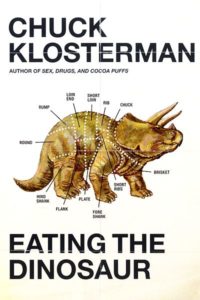Over the past four or five years, I have followed the interaction between these two while staying away from Klosterman’s essay collections for no real reason. I tried to get them a few years back when I went to the beach, but only his novel “Downtown Owl” was available at the library. I kept meaning to go back and get his non-fiction work, but never did.
 His work came up in conversation at a friend’s house a few months ago, and I ended up borrowing a copy of “Eating the Dinosaur,” Klosterman’s most recent essay collection. He has recently released a second novel, which I might get soon.
His work came up in conversation at a friend’s house a few months ago, and I ended up borrowing a copy of “Eating the Dinosaur,” Klosterman’s most recent essay collection. He has recently released a second novel, which I might get soon.
Anyway, I finished the book at the beach recently and know full well while I love listening to Klosterman’s point of view while simultaneously which he wold shut off his brain and stop talking. If you’re not familiar with his work,he’s very curious about sports and pop culture, sometimes to the point of exploring avenues that no one would ever consider.
This is where the maddening part comes into play. One of the essays focuses on the basketball career and legacy of former pro Ralph Sampson. A giant with incredible skills, Sampson dominated the college game, but never fulfilled that promise as a pro. He had a decent career, but nothing close to what many people expected.
Klosterman apparently takes offense at this development and writes the essay as if all basketball fans, and possibly sports fans, hold a grudge against Sampson for not dominating the pros. He almost seems to think we were ripped off by having expectations based on the physical specimen we saw before us.
In reality, Klosterna gives more thought to Ralph Sampson than probably everyone else in the world combined, including Ralph Sampson. Sure, it sucks he didn’t pan out as a Hall of Famer, but I don’t think most people have enough vitriol about that development to carry on a conversation about it, much less write a long essay on how it affected us.
The chapter is called “What We Talk About When We Talk About Ralph Sampson,” and it’s this misuse of the first person plural that bothers me. It’s what you talk about when you talk about Ralph Sampson, Chuck. The rest of us don’t care that much and projecting your feelings on us makes the essay weak.
Luckily, the rest of the book fascinates. He ties together Kurt Cobain and David Koresh, examines the inanity of laugh tracks and their impact on television writing and expertly analyzes the relevance of Ted Kaczynski ‘s manifesto in the Internet age. He will definitely make you think. I’m looking forward to going back and reading his other essay collections. I just hope they don’t have a detailed take down of Mark Fidrych.
